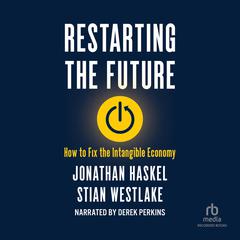 Play Audiobook Sample
Play Audiobook Sample
Capitalism Without Capital: The Rise of the Intangible Economy Audiobook
 Play Audiobook Sample
Play Audiobook Sample
Quick Stats About this Audiobook
Total Audiobook Chapters:
Longest Chapter Length:
Shortest Chapter Length:
Average Chapter Length:
Audiobooks by this Author:
Publisher Description
The first comprehensive account of the growing dominance of the intangible economy Early in the twenty-first century, a quiet revolution occurred. For the first time, the major developed economies began to invest more in intangible assets, like design, branding, R&D, or software, than in tangible assets, like machinery, buildings, and computers. For all sorts of businesses, from tech firms and pharma companies to coffee shops and gyms, the ability to deploy assets that one can neither see nor touch is increasingly the main source of long-term success. But this is not just a familiar story of the so-called new economy. Capitalism without Capital shows that the growing importance of intangible assets has also played a role in some of the big economic changes of the last decade. The rise of intangible investment is, Jonathan Haskel and Stian Westlake argue, an underappreciated cause of phenomena from economic inequality to stagnating productivity. Haskel and Westlake bring together a decade of research on how to measure intangible investment and its impact on national accounts, showing the amount different countries invest in intangibles, how this has changed over time, and the latest thinking on how to assess this. They explore the unusual economic characteristics of intangible investment, and discuss how these features make an intangible-rich economy fundamentally different from one based on tangibles. Capitalism without Capital concludes by presenting three possible scenarios for what the future of an intangible world might be like, and by outlining how managers, investors, and policymakers can exploit the characteristics of an intangible age to grow their businesses, portfolios, and economies. Author bio: Jonathan Haskel is professor of economics at Imperial College London. Stian Westlake is a senior fellow at Nesta, the UK's national foundation for innovation.
Download and start listening now!
“The historical view of ‘capital as something tangible persists and limits our thinking,’ the authors argue. To be sure, exactly which intangible assets qualify as capital can be debated endlessly. In Capitalism without Capital, [they] choose a broad definition and explore its implications…[and] make a good case that we don’t know as much as we think because some of our tools for measuring economic performance are out of date.”
— Wall Street Journal
Quotes
-
"[Capitalism without Capital] needs to be read by anyone seeking to understand the nature of modern capitalism and its politics.”
— Times (London) -
“[Haskel and Westlake] describe in an entertaining and engaging way why governments need to count innovation as an engine of profit.”
— Nature
Awards
-
A Financial Times Best Book of the Year for 2017
-
An Economist Best Book of 2017
Capitalism Without Capital Listener Reviews
Be the first to write a review about this audiobook!
About Derek Perkins
Derek Perkins is a professional narrator and voice actor. He has earned numerous AudioFile Earphones Awards and the prestigious Audie Award for Best Narration, as well as numerous Society of Voice Arts nominations. AudioFile magazine named him a Best Voice consecutively in 2014, 2015, and 2016. Augmented by a knowledge of three foreign languages and a facility with accents, he has narrated numerous titles in a wide range of fiction and nonfiction genres.




